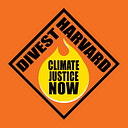Harvard Corporation Refuses Dialogue on Divestment
Harvard has said that it wants an open discourse on divestment. So why is it backing out of commitments to talk?
On March 15, our campaign filed a complaint with the Office of Massachusetts Attorney General Maura Healey arguing that Harvard’s investments in fossil fuels (estimated at around $838 million) are not only immoral, but illegal. The 56-page document, which outlines how these holdings violate the Harvard Corporation’s duties as a charitable institution, was signed by more than 80 elected officials; climate scientists; financial leaders; Harvard students, faculty, alumni, and community members; and campus, civic, and environmental organizations.
On March 16, the Harvard administration cancelled a previously scheduled meeting between our campaign and Harvard Corporation member William Lee, set for March 29. In a series of emails, Harvard claimed that the complaint was “unfair and unfounded,” and that it would be “inappropriate and unwarranted” for Corporation members to come to the table to discuss divestment and climate leadership following its submission.
There is, to be clear, no legal reason for the Harvard Corporation to shut down dialogue with our campaign. The complaint to AG Healey is a letter from constituents to an elected official, not a lawsuit; because our campaign has initiated no formal legal proceedings, there are no legal restrictions on communication. Rather, Harvard has chosen to use our complaint as an excuse to shy away from difficult and honest conversation.
The Harvard Corporation’s decision sends a clear signal that it does not value open dialogue. As members of the community who are deeply committed to open and honest discourse on this essential issue, we are disappointed by this development. Indeed, Harvard’s response reinforces a key argument of the complaint — that Harvard has failed to fulfill its legally-mandated duty of care by neglecting to give proper consideration to calls for change.
The March 29 meeting with Mr. Lee was intended as a follow-up to our first-ever meeting with President Bacow and the full Corporation Committee on Shareholder Responsibility, which oversees Harvard’s endowment, back in December 2020. At this next meeting, we hoped to identify concrete ways our campaign could work with the university to bolster its commitment to make the endowment portfolio net-zero in terms of greenhouse gas emissions by 2050, given the substantial inadequacies and loopholes of that commitment.
We also hoped to discuss the Harvard Management Company’s first report on its progress toward meeting this commitment. As we wrote in our public response, the report reflects some positive developments, but also includes significant shortcomings. We were glad, for example, to hear that Harvard has finally recognized the role its endowment plays in combating climate change. Yet even as Harvard recognizes the urgent need for climate action, it has not taken the most basic step of formalizing a policy of noninvestment in companies that explore or develop further reserves of fossil fuels. We were also alarmed to see that Harvard’s decarbonization plan is still not in line with IPCC targets to limit global warming, lacking any interim goals for decarbonizing the endowment and relying on ineffective carbon accounting methods.
We remain as committed as ever to open dialogue with the Harvard Corporation, Harvard Management Company, and any other members of the university administration. We hope that Harvard will reciprocate this openness.
Follow Fossil Fuel Divest Harvard on Twitter, Facebook, Instagram, and TikTok. And want to join one of our meetings and see what we’re all about? Fill out this interest form!
